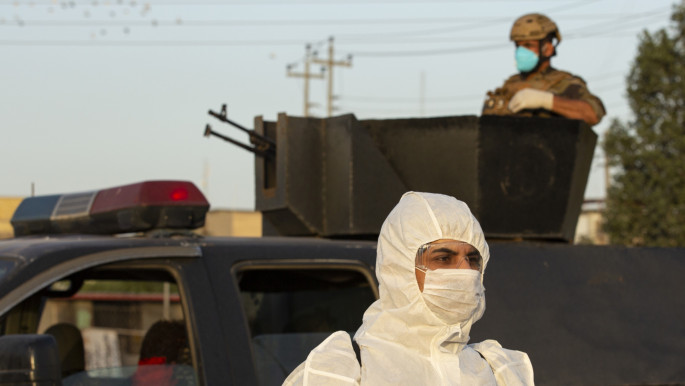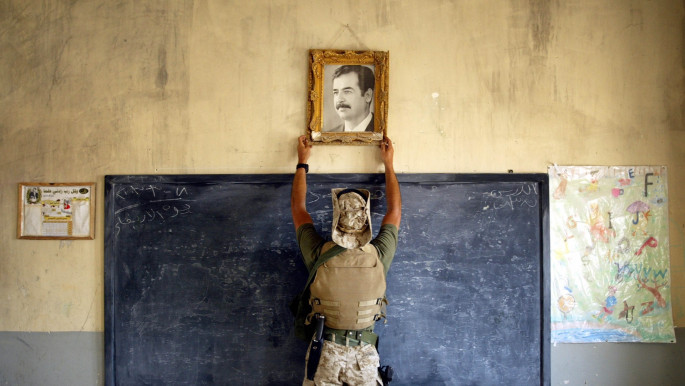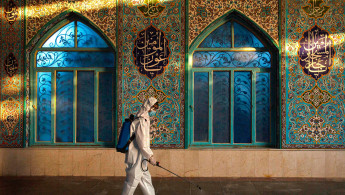Fighting fake news in Iraq's battle against Covid-19
Even if today most people in the streets are wearing a mask, this has been far from the case across Iraq in recent months.
"I have been struggling so much to convince people that they had to keep social distance, and they cannot pass over their used masks to their family members," Caroline Walker, Middle East Health Promotion Adviser with Médecins Sans Frontieres (MSF), tells The New Arab.
Besides omnipresent scepticism, "there is a sense of destiny and resignation", says Walker, with "many community members saying 'we have been through a lot, this is nothing'".
Across Iraq and the Kurdish region, acknowledging the existence of Covid-19 has been a long and arduous process. People only resigned themselves to admitting there was a pandemic when cases and deaths started to rise during the summer.
Cases have been rising exponentially from July onwards, and since the end of August Iraq has registered between 4,000 to 5,000 new Covid-19 cases every day.
Economic and political crises undermine trust
"Iraq is a battlefield for multiple regional powers and has been bombarded with misinformation and propaganda during Saddam's regime, when the only two television channels were both governmental," Faisal Saeed Al Mutar, the founder of Ideas Beyond Borders (IBB), one of many private organisations working to disseminate accurate information around Covid-19, told The New Arab.
 |
Iraq is a battlefield for multiple regional powers and has been bombarded with misinformation and propaganda |  |
"This has a major role in the fact the people have always been told what to think, and are not able to think critically and for themselves. Moreover, they mistrust anything from both inside and outside the country, and so conspiracy theories grow".
Mistrust towards the government is prevalent and many people believe the pandemic could be a ploy from authorities to prevent people from moving freely and to delay the payment of salaries in the public sector, already months late due to a series of economic crises.
 |
|
| The Iraq Report: Political paralysis slows fight against coronavirus amid economic woes |
"We can't say the health ministry is giving fake numbers. But I don't think Iraq is testing enough people. They give numbers according to the tested cases, which are limited," Bahr Jasim, a journalist from Kirkuk now living in Europe and volunteer communication officer for Tech4Peace, told The New Arab.
Spreading awareness online
Their mission, as with Ideas Beyond Borders (IBB), is to "spread awareness and the right sources of information, using simple words. We reduce the complexity and the amount of information," Jasim says.
Before Covid-19, both organisations already worked on monitoring online rumours, analysing and verifying them, and then providing corrections and reliable sources. Although Arabic is the fourth most used language by internet users, "only 2% of all scientific content is available in Arabic", complains Faisal, "and most people are monolingual or speak Kurdish but not English, so they don't have much exposure to international content".
In their three years of operations, IBB has added 17,000 articles in Arabic to Wikipedia, thanks to a team of 120 full-time translators living across the Middle East.
 |
Civic platforms across Iraq are stepping up to combat misinformation about Covid-19 |  |
According to DataReportal, internet penetration was 75 percent in January 2020 (the global average is 59 percent) and the number of internet users increased by 55 percent (11 million people) between 2019 and 2020.
According to the same source, social media penetration was 53 percent in Iraq and 49 percent worldwide in January 2020, and the number of social media users in Iraq increased by 1.9 million (+9.8 percent) between April 2019 and January 2020. Facebook remains the most used social platform worldwide, and Iraq is no exception. Of a total population of more than 40 million people, Iraq has almost 24 million Facebook users.
Since the beginning of the pandemic, both Tech4Peace and IBB expanded their team of doctors, researchers and journalists, and began focusing on Covid-19. "Before Covid-19 there were just a few cases that required our opinion, once every 2-3 weeks," explains a Baghdadi doctor working for Tech4Peace.
 |
|
| Read more: Once Upon a Time in Iraq: A harrowing but flawed narrative of a traumatised nation |
"Now we receive 2,000 messages and tags on social media every week. We have 3 million readers per week, and 1.5 million followers. And a lot of them actually defend us from haters and accusatory comments," said the medical practitioner, who wished to remain anonymous, as do most of the staff from both organisations.
Struggling to be believed
In a complex, multi-confessional and politically turbulent country such as Iraq, public information can be a difficult task. "It's easier for people to believe us if they don't belong to any particular religious sector or party. Otherwise they accuse us of being sponsored by a party," explains Bahr Jasim. "The different beliefs of people are the main difficulty we face, together with old traditional and tribal thoughts, especially from elderly people," another colleague confirms.
"Most of my patients believe more in what they read on social media rather than my word," the doctor from Baghdad, who has worked in hospitals across the capital since 2018, says.
 |
In a complex and politically turbulent country public information can be a difficult task |  |
"When I try to explain, the person in front of me thinks he already knows, you can see from the way they talk to their family. They will tell me yes, but you can see they are still not convinced. And working in an emergency department, I don't always have time to explain further. This is also why it's easier to convince people by publishing on social media. When they read our post, they are relaxing in their homes, they can take the time".
Facebook and public communication
 |
|
| Read more: Coronavirus exposes information crisis and digital inequality in the Arab world |
Using Facebook as the primary tool for communicating awareness around Covid-19 has been the case for many NGOs too.
Caroline Walker from MSF says this was an efficient platform for the NGO's communication campaign to share basic health messages and personal stories, supporting awareness. "[Facebook] posts stated that more people in Mosul are washing in response to Covid-19 and yielded positive feedback and messages of support for those affected".
As a response to the Facebook campaign, "appreciation has been shown for practical and feasible ways to prevent Covid-19 infections. Some people were saying thanks for the information," Walker says.
While at the beginning of the campaign some people responded that "Covid-19 is not real but merely Typhoid, that disease, life and death is fate," now there is more acknowledgement about its impact. "As the pandemic developed, Facebook posts on how Covid-19 is real and not a myth were appreciated," Walker adds.
Despite the difficulty in evaluating the impact of social media on public information, progress is undeniable. "I see people themselves asking to provide sources for what they read," says Bahr Jasim.
"It even happened that official media quoted us after we clarified a news story". In Iraq as with everywhere else, "people want to find a solution, a rescue," Jasim adds. "They want and need to believe in something and find answers".
Sofia Nitti is an Italian video journalist based in Erbil, Iraq
Follow her on Twitter: @SofiaNitti



